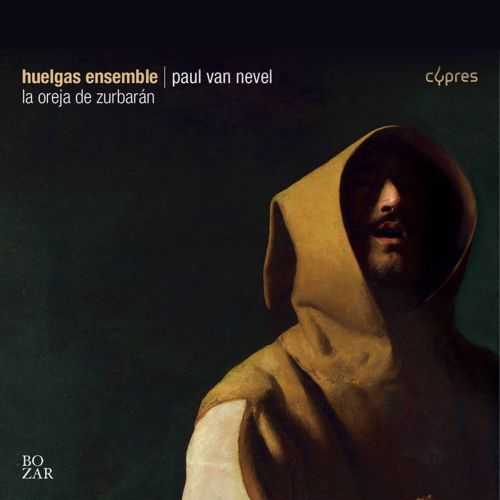
Performer: Huelgas Ensemble
Conductor: Paul Van Nevel
Audio CD
Number of Discs: 1
Format: FLAC (tracks)
Label: Cypres
Size: 1.02 GB
Recovery: +3%
Scan: yes
01. Andrés Barea – Miserere mei Deus
02. Anon – Rio de Sevilla
03. Juan Garcia de Salazar – Lauda Sion Salvatorem
04. Diego de Pontac – Agnus Dei ‘In exitu Israel’
05. Manuel Machado – Dos estrellas le seguen
06. Fray José de Vaquedano – Lamentaciones
07. Mateo Romero – Fatigada navecilla
08. Miguel de Ambiela – Stabat Mater dolorosa
Divine Vertigo
This project from Paul Van Nevel and the Huelgas Ensemble was inspired by the paintings of Franciso de Zurbarán, one of the masters of the Spanish Golden Age. His art was directed to a large extent by the then current obsessive goal of the mystical union of the self with the Church (acting as the embodiment of God). In the cloisters of Counter-Reformatory Spain, a ferment of religious zeal and a drive to achieve spiritual ecstasy was to be fuelled by powerful works of both art and music, uniting the temporal with the divine.
Music of the period was of course heavily indebted to both Victoria and Palestrina, yet the old order was beginning to crack; the strict counterpoint of the Stile antico was under threat both from without – in the Seconda prattica which began in the early part of the century in Italy, driven by composers like Monteverdi and Caccini in their quest for heightened realism – and from within in the form of the villancico, very much the voice of the people. Both of these streams can be heard here, ratcheting up the intensity and allowing the visionary sparks to catch and ignite, moving the listeners closer to the experience of that great contemporary mystic, St Teresa of Avila.
Van Nevel has unearthed works by many hitherto unknown composers – mostly cathedral chapelmasters – whose music may well have been heard by Zurbarán, and what extraordinary music it is. Richly harmonic, melismatic and at times highly ornamented, one can well imagine the intoxication which might have resulted as the senses were elevated to a near trance-like state. Not all is sacred, there are some profane works here too, the voice of Lope de Vega by now clearly imprinted on Spanish poetry.
The Ensemble deliver performances in which the voices reflect the devotional focus with an unwavering resolve, the urgency and drive never seemingly compromised by technical or interpretative hesitation. Rich and visceral one moment, gauzy and minimal the next, the singers push ever onward, the occasional stab of chromatic contradiction only heightening the emotional ride.
Van Nevel’s warning on the packet of his Eton Choirbook exhorted against breathing the music in too deeply, lest we too succumb. The same could be said, and possibly more so, of the contents of this quite extraordinary recording.